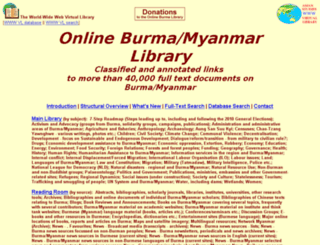Focal point
Location
The Online Burma/Myanmar Library (OBL) is a non-profit online research library mainly in English and Burmese serving academics, activists, diplomats, NGOs, CSOs, CBOs and other Burmese and international actors. It is also, of course, open to the general public. Though we provide lists of Burma/Myanmar news sources, the Library’s main content is not news but in-depth articles, reports, laws, videos and links to other websites, We provide a search engine (database and full text) and an alphabetical list of categories and sub-categories, but the Library is best accessed through browsing the 100 or so categories which lead to sub- and sub-sub categories. These tools should be used in combination.
Members:
Resources
Displaying 231 - 235 of 1151Following the Money: An Advocate's Guide to Securing Accountability in Agricultural Investments
... Large-scale agricultural investments – in plantations, processing plants or contract farming schemes, for example – have increased in recent years, particularly in developing countries. Investment in the agriculture sector can bring much needed support for rural development, but communities have also witnessed significant negative impacts. Some of the most serious involve local landholders being displaced from their lands and losing access to
“We are not afraid” Land rights defenders: attacked for confronting unbridled development
The scale of attacks against land rights defenders is particularly preoccupying and should attract our utmost reaction and urgent mobilisation.
The toll they pay, together with their families and communities, is dramatic,
be it killings, forced disappearances, harassment or criminalisation. Caught
in the crossfire between poor land users fighting for the respect of their basic
human rights and powerful economic actors fighting for juicy profits, they
account as one of the most vulnerable categories of human rights defenders.
Land and River Grabbing: the Mekong’s Greatest Challenge
Throughout the Mekong region, large-scale development projects such
as hydropower dams, mines, conventional power plants, and mono-crop
plantations are displacing communities and limiting access to natural
resources. Several hydropower dams have already been built on the
Upper Mekong in China’s Yunnan Province, and the governments of
Cambodia, Laos and Thailand are planning eleven additional large dams
on the Mekong River’s mainstream. If completed, these dams would
not only destroy local ecosystems, but also reduce the ow of silt
MYANMAR KACHIN & NORTHERN SHAN STATES CAMP PROFILING ROUNDS 1-3: CROSS-CAMP AND TREND ANALYSIS REPORT 2013-2015
EXECUTIVE SUMMARY: "Since June 2011, conflict between the Government of Myanmar and the Kachin Independence
Organisation (KIO) left a large number of people displaced across Myanmar’s Kachin and northern
Shan States. Although it is likely that many people were displaced before this date, it is estimated that
at least 95,000 have been displaced as of October 2015 as a result of this resurgence of conflict. Most of
the internally displaced persons (IDPs) are living with host families or in camps dispersed across the
area in 166 identified locations.
Working Together for a Better Kachin Landscape (Sound)
Forestry Water Management, Landscape Approach and Land Management in Kachin State, northern Myanmar.


